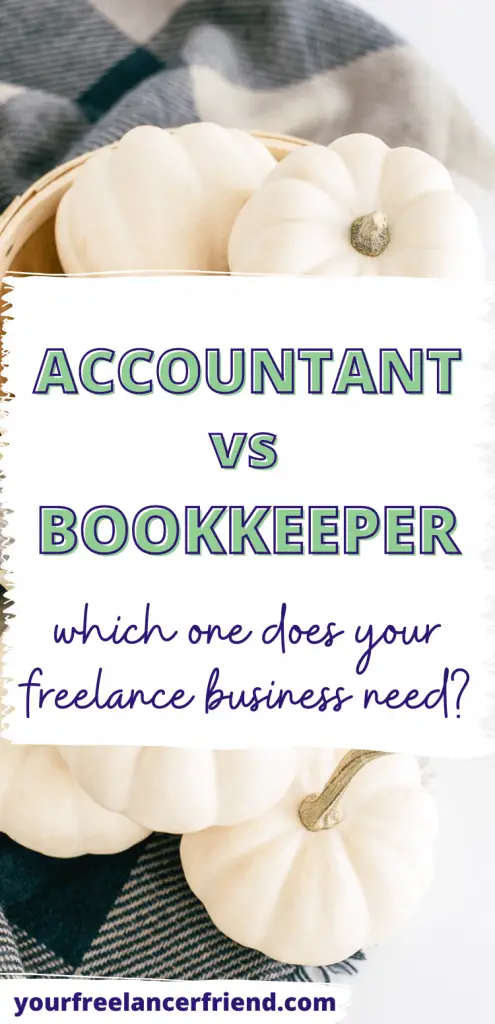When I started freelancing, I had no idea what was the difference between a bookkeeper and an accountant—and I didn’t have either.
But if you’re frustrated trying to figure out how to get your freelance finances in order, track how much you’re really making, estimate your quarterly taxes, or become an LLC, you’d greatly benefit from the help of a bookkeeper and/or an accountant.
Below, I’ll detail the differences between the two and when you need to hire them based on my own experience. Let’s dive in!

What Is a Bookkeeper?
A bookkeeper is a financial professional who keeps your “books” in order. Your books are the places (physical or digital) where you keep a record of your income and expenses; this could be a sheet of paper (not recommended), an Excel spreadsheet, or accounting software such as Wave, Quickbooks, or Xero.
It is the bookkeeper’s job to review your books—say, once a month—and “reconcile” each transaction; that means they look at each transaction in your business and categorize it according to its type. For example, if they see you spent $50 at Office Depot, they’re going to assume that you bought office supplies for your business and will categorize it as such and check that you’ve got a receipt for proof of that expense. Or, if they see you that you transferred $2,000 from your business checking account to your personal checking account, they will categorize that as “Owner’s Draw,” meaning you were paying yourself. This is important because, otherwise, it could look like you had a true business expense there, when in fact, paying yourself cannot be written off as a business expense.
Why does a bookkeeper’s job matter? Well, because, come tax time, when it’s time to file your income tax return, your accountant will need to see your books to know exactly how much money you made, how many expenses you had, how much of those expenses are tax deductions, and ultimately, how much you need to pay in taxes.
Without a bookkeeper, your income and expenses can become a mess—and it will be very hard to sort through them all to complete your annual income tax return.
What Is an Accountant?
An accountant is a professional who can do all the duties of a bookkeeper, but typically, they specialize in financial consulting, tax consulting, and tax returns.
What can an accountant do for your freelance business?
- An accountant can do your bookkeeping.
- You can meet with an accountant before you open your business to get advice on whether you should start as a sole proprietor or an LLC.
- You can ask an accountant to help you estimate your quarterly estimated tax payments.
- You can have an accountant prepare your income tax return.
- You can ask an accountant for advice on how to legally lower your tax bill.
- You can ask an accountant for advice on whether your LLC should become an S corp.
- You can meet with an accountant to find out whether a particular purchase qualifies as a business expense.
- And so much more!
The most common reason that a freelancer hires an accountant is to have them prepare their income tax return.
What’s the Difference Between a Bookkeeper and an Accountant?
A bookkeeper does not need any licensing or any sort of degree to do bookkeeping. They usually cost less than an accountant.
An accountant must have completed at least a Bachelor’s degree. And a Certified Public Accountant must be licensed as such. CPAs must maintain their status by taking certain continuing education classes and taking an exam every couple of years. An accountant can also do bookkeeping. They typically cost more than someone who is only a bookkeeper.
When Should I Hire a Bookkeeper?
If you’re making a substantial income from your freelance business and you aren’t keeping track of your income and expenses, it’s time to hire a bookkeeper. Alternatively, you could teach yourself how to do the basic bookkeeping steps for your business. For that, I highly recommend CPA Amy Northard’s online course Be Your Own CFO.
When Should I Hire an Accountant?
If you are just starting your freelance business, I recommend meeting with a local accountant who can guide you in properly setting up your business, such as helping you to:
- Register your business at the city and county level (if needed)
- Apply for sales tax receipts (if needed)
- Form an LLC (if needed)
- Setting up your books
After you’ve started your freelance business, I recommend, at a minimum, that you hire an accountant every year between January and March to prepare your income tax return. When you’re self-employed, your tax return becomes more complicated than when you were employed and only had W2s to worry about.
Couldn’t I Just Do This All Myself?!
Yes, you could! I don’t want to make it sound like there’s any rule or law that says you must hire a bookkeeper or accountant as a freelancer (there isn’t). But as your business grows, your accounts become so much more complicated. Also, when it comes to taxes, it’s important to do things right.
Again, if you’re interested in DIYing your bookkeeping, then try the online course Be Your Own CFO to figure out how to do it yourself.
How Do I Find a Good Accountant Who Works With Freelancers?
Now that you know the difference between a bookkeeper and an accountant, you may be wondering how to go about finding these professionals.
Finding an accountant who understands your freelance business can be tough! Many accountants work with big corporations and businesses with employees and aren’t used to the scrappy work of a solo freelancer. I went through many accountants before I found one that I love working with!
Find out how to find the right accountant for your freelance business!














Add comment